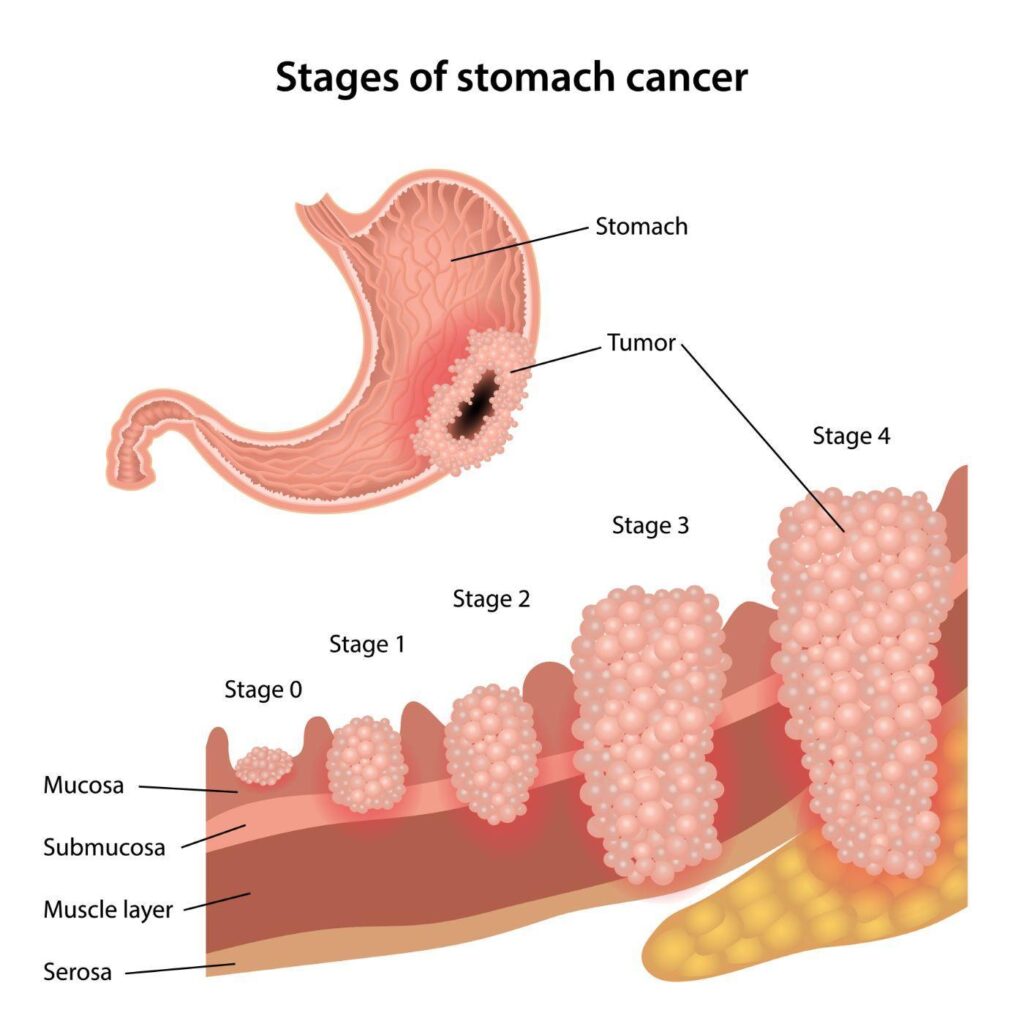Introduction:
Welcome to our comprehensive guide on gastric cancer. Gastric cancer, also known as stomach cancer, is a serious and often life-changing diagnosis. Our goal with this guide is to provide you with a thorough understanding of gastric cancer, including its causes, symptoms, diagnosis, treatment options, and supportive resources. Whether you’re a patient, caregiver, or simply seeking knowledge, we’re here to empower you on your journey toward better health and well-being.

Understanding Gastric Cancer:
- Overview: Provide an overview of gastric cancer, explaining its definition, types (e.g., adenocarcinoma, gastrointestinal stromal tumors), and how it develops.
- Causes and Risk Factors: Explore the various factors that can contribute to the development of gastric cancer, such as Helicobacter pylori infection, genetics, diet (e.g., high intake of smoked or salty foods), and environmental factors (e.g., exposure to certain chemicals).
- Epidemiology: Offer insights into the global prevalence of gastric cancer, highlighting regions with higher incidence rates and trends over time.
Signs and Symptoms:
- Common Symptoms: Detail the common signs and symptoms of gastric cancer, including abdominal pain or discomfort, indigestion, unintentional weight loss, nausea, vomiting, and appetite changes.
- Advanced Symptoms: Discuss symptoms that may indicate advanced gastric cancer, such as difficulty swallowing, blood in the stool, and jaundice.
Diagnosis and Staging:
- Diagnostic Procedures: Explain the diagnostic tests and procedures used to detect and diagnose gastric cancer, including upper endoscopy (esophagogastroduodenoscopy or EGD), biopsy, imaging tests (e.g., CT scan, MRI), and blood tests (e.g., tumor markers).
- Staging: Describe the staging system used to determine the extent of gastric cancer spread, such as the TNM staging system, and how staging influences treatment decisions.
Treatment Options:
- Surgery: Discuss surgical options for treating gastric cancer, including partial or total gastrectomy, lymph node dissection, and minimally invasive techniques (e.g., laparoscopic or robotic surgery).
- Chemotherapy: Explore the role of chemotherapy in treating gastric cancer, including adjuvant and neoadjuvant chemotherapy regimens, and potential side effects.
- Radiation Therapy: Explain how radiation therapy can be used to target and destroy cancer cells in the stomach, either alone or in combination with other treatments.
- Targeted Therapy and Immunotherapy: Highlight the use of targeted therapy drugs (e.g., trastuzumab) and immunotherapy agents (e.g., pembrolizumab) in treating specific types of gastric cancer, such as HER2-positive tumors or advanced disease.
Living with Gastric Cancer:
- Coping Strategies: Offer practical tips and strategies for coping with a gastric cancer diagnosis, managing treatment side effects, and maintaining emotional well-being.
- Nutritional Guidance: Provide dietary recommendations and nutritional advice for individuals living with gastric cancer, including tips for managing eating difficulties and maintaining adequate nutrition during treatment.
- Support Services: Connect patients and caregivers with support groups, counseling services, and other resources to help them navigate the challenges of living with gastric cancer.
Research and Innovation:
- Clinical Trials: Inform readers about the latest clinical trials and research studies investigating new treatments and therapies for gastric cancer, and how they can participate in clinical trials.
- Advances in Treatment: Highlight recent advancements in gastric cancer treatment, including emerging therapies and novel treatment approaches, such as precision medicine and immunotherapy.
Stories of Inspiration:
- Survivor Stories: Share inspiring stories of individuals who have faced gastric cancer with courage and resilience, highlighting their journeys, challenges, and triumphs.
- Caregiver Perspectives: Feature insights and experiences from caregivers who have provided support and care to loved ones battling gastric cancer, offering guidance and encouragement to others in similar situations.
Conclusion:
At Gastric Cancer Guide, we’re dedicated to providing comprehensive information and support to individuals affected by gastric cancer. Our website serves as a beacon of knowledge, empowerment, and hope, offering valuable resources and a supportive community for those navigating the complexities of gastric cancer. Together, we can raise awareness, foster understanding, and empower individuals to thrive beyond their diagnosis. Join us in our mission to make a difference in the fight against gastric cancer.
